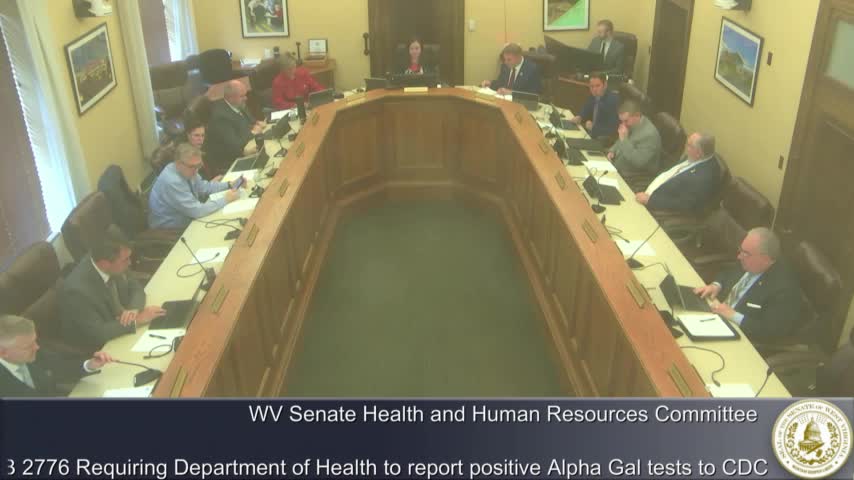Senate committee advances HB 2776 after lengthy debate over vaccine exemptions and alpha-gal reporting
Get AI-powered insights, summaries, and transcripts
Subscribe
Summary
A Senate committee reported House Bill 2776 to the full Senate with amendments that add alpha-gal syndrome to reportable diseases and revise medical and religious school immunization exemptions after debate and two floor amendments.
The West Virginia Senate committee voted to report House Bill 2776 to the full Senate with a recommendation that it pass as amended, following extended debate over changes to school immunization law and a provision adding alpha-gal syndrome to a reportable-diseases list. The committee advanced the bill by voice vote after adopting one amendment and rejecting another.
Counsel told the committee that the bill would “require the secretary of the department of health to propose legislative rules to include alpha gal syndrome on the list of diseases that shall be required to be reported to the Centers for Disease Control and Prevention,” and that the committee amendment revises mandatory vaccination requirements for public, private and parochial schools and state-regulated child care centers, replacing references to the commissioner with the state health officer.
The committee amendment also revises the medical exemption process, permitting a physician, physician assistant or nurse practitioner to submit a written statement to a school administrator that a specific immunization “is or may be detrimental to the child’s health or are not appropriate.” It creates a religious exemption allowing a parent, legal guardian or emancipated child to provide an annually notarized statement on a Department of Health form acknowledging that the signer holds a religious belief opposed to immunizations and has reviewed evidence-based educational materials provided by the department; counsel said the signed form shall not be construed to create or deny civil liability or be admissible as evidence in any civil proceeding. The amendment includes an exemption for full-time virtual public school students and requires reporting by schools of exemption counts and percentages.
During debate, a Senior Senator from the Seventeenth urged rejection of language in the amendment that removed a misdemeanor penalty for knowingly providing a false certificate of immunization; the senator described potential public-health consequences and urged a no vote on the bill. That proposed amendment to retain criminal penalties was rejected by the committee; the chair declared “the noes have it,” and the amendment failed on a recorded division. Counsel said she could not explain the policy reason the penalty language was removed.
Another amendment, offered by a junior senator, would expressly permit students exempted under the bill to participate in extracurricular activities and school events; the committee adopted that amendment by voice vote.
After the amendments, the vice chair moved the bill be reported to the full Senate with a recommendation that it do pass as amended; the motion was adopted by voice vote.
The committee record shows no fiscal note for the committee amendment; counsel said the only government agency affected is the Department of Health and that the bill’s effective date is 90 days. Counsel also said the bill’s title needs amendment.
The bill also retains its initial provision (Chapter 16, Article 1, Section 4) requiring the Department of Health to propose rules to add alpha-gal syndrome to the list of diseases to be reported to the Centers for Disease Control and Prevention; counsel and senators clarified that the added immunization-exemption provisions are in a different code section but were judged germane to the bill’s subject of state public health systems.
The committee did not provide a roll-call tally for the final report motion; the chair announced the ayes had it and declared the motion adopted.
If the full Senate approves the committee’s recommendation, HB 2776 would move forward with the committee-substitute language as described above. Additional procedural and title edits remain to be made before floor consideration.
